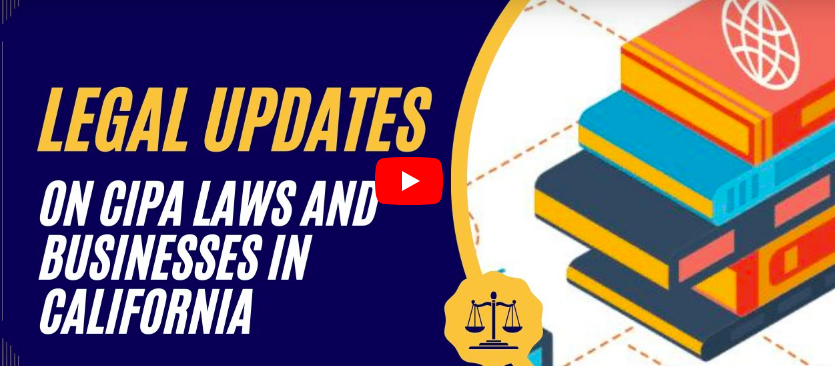
Posted on September 23rd, 2024
In today’s digital world, keeping up with legal changes is crucial for business owners, especially when it comes to privacy laws. Two recent federal court decisions have made it clear that companies using website analytics tools could face an increase in California Invasion of Privacy Act (CIPA) claims. If you’re a California employer, here’s what you need to know to stay compliant and protect your business.
A Brief Overview of CIPA
The California Invasion of Privacy Act (CIPA) was passed in 1967 to protect individuals from unauthorized surveillance and tracking. While it was originally intended to prevent physical invasions of privacy—think wiretapping or eavesdropping—recent court rulings suggest that CIPA may now apply to the digital tracking tools that many businesses use on their websites.
What the Recent Rulings Mean
Two federal court decisions have broadened the scope of CIPA, giving plaintiffs more opportunities to sue businesses for their online tracking practices. Here are the key takeaways from these rulings:
-
CIPA Applies to Online Tracking Tools
In one case, a court ruled that CIPA isn’t limited to physical tracking devices; it can apply to online tools like cookies, pixels, and web beacons. Many companies use these tools to track user behavior, but now they may be at risk of violating CIPA. If your business uses any of these tools to gather data about website visitors, you could be facing potential legal challenges.
-
Consent Defense Has Been Weakened
In another case, the Ninth Circuit Court ruled that simply having a privacy policy or cookie banner might not be enough to defend against a CIPA claim. Even if users agree to a privacy policy, the court emphasized that they need to clearly understand what they’re consenting to. This weakens the argument that users “implied” their consent just by continuing to use a website.
How California Employers Can Protect Themselves
If your business website uses tracking technology—like ad pixels, cookies, or web beacons—these decisions should be a wake-up call. Here are a few key steps to take to reduce the risk of facing a CIPA lawsuit:
-
Obtain Explicit Consent
Make sure you’re getting clear, opt-in consent from website visitors before tracking their activity. This means using a cookie banner that requires users to actively agree to be tracked. Avoid “sneaky” dark patterns that trick users into giving consent.
-
Review and Update Privacy Policies
Regularly review your privacy and cookie policies to ensure they’re clear, up-to-date, and easy to understand. Make sure the average user can easily grasp what data you’re collecting and why. The more transparent you are, the better your defense against potential CIPA claims.
-
Monitor Legal Developments
CIPA-related lawsuits are on the rise, and privacy laws continue to evolve. Stay informed about new legal developments to ensure your business remains compliant. Regularly consult with legal professionals who can help guide you through these changes.
Conclusion
As the digital landscape evolves, so do the privacy laws that govern it. The recent court rulings make it clear that CIPA isn’t just about physical privacy any more—it also applies to online tracking tools. California employers must be proactive in updating their tracking practices and privacy policies to avoid costly lawsuits. By obtaining explicit consent from website users and keeping policies transparent, you can safeguard your business against the rising tide of CIPA claims.
FAQ: Recent CIPA Decisions and Their Impact on California Employers
1. What is the California Invasion of Privacy Act (CIPA)? CIPA is a California law passed in 1967 to protect individuals from unauthorized surveillance and privacy invasions, such as wiretapping and eavesdropping. Recently, courts have expanded their interpretation to cover online tracking tools used on websites, like cookies and pixels.
2. How do recent court decisions affect businesses using website tracking tools? Two recent federal court rulings have broadened CIPA’s scope. Courts are now interpreting CIPA to apply to online tracking tools such as cookies, pixels, and web beacons. This means that businesses using these tools could be exposed to lawsuits under CIPA, even if they had previously believed they were compliant.
3. Which tracking tools might be affected by these rulings? Common website tracking tools, including cookies, pixels, web beacons, and other analytics tools that monitor user behavior, are now seen as potential violations of CIPA. Even tools used for targeted advertising could lead to CIPA claims if proper consent isn’t obtained.
4. Does having a privacy policy protect my business from CIPA claims? Not necessarily. One of the recent rulings weakened the argument that a website’s privacy or cookie policy alone provides sufficient consent for tracking. Courts now suggest that users must clearly understand and actively agree to the tracking practices—meaning simply having a privacy policy might not be enough to defend against CIPA claims.
5. What happens if my business doesn’t comply with CIPA? If your business is found to violate CIPA, you could face lawsuits from individuals claiming their privacy was invaded. These lawsuits can result in significant legal fees, damages, and reputational harm to your business.


